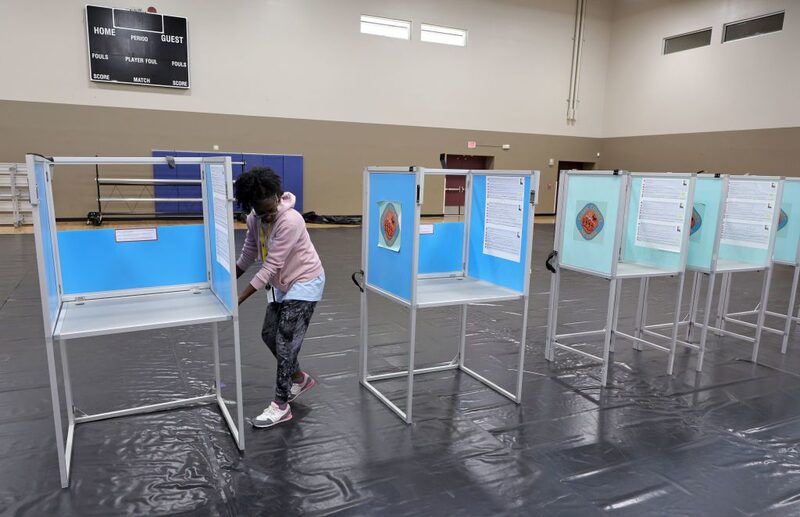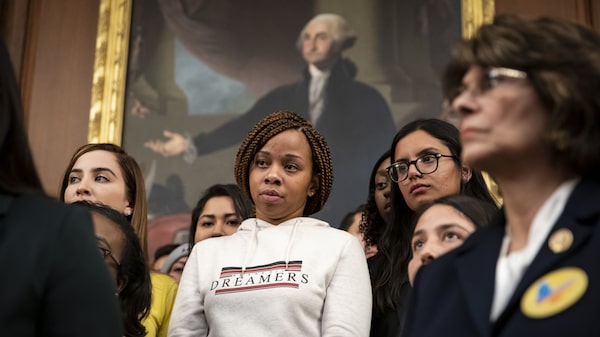Bloomberg — Americans are headed to the ballot box amid a surge of partisan election lawsuits in another sign of growing US polarization around the franchise.
Even before Tuesday’s midterm elections, more lawsuits have been filed this year than in all of 2020 by Democrats and Republicans challenging everything from who can vote to where ballots are collected and monitored.
So far, at least 157 suits were filed by partisans, and more are likely after Election Day, according to Democracy Docket, a left-leaning nonprofit that tracks the cases. In 2020, there were about 150, including dozens of failed attempts by Republicans to overturn President Joe Biden’s victory over Donald Trump.
Cases filed in almost three dozen states raise questions about virtually every aspect of voting, from the purging of voter rolls to the counting of mail-in ballots with missing details. Other suits seek to reign in use of drop boxes and allow private groups to monitor people as they cast their ballots. Under the US Constitution, each state can run all its own elections, so the legal challenges hinge on how courts interpret different state election laws and constitutions.
“We are in an era where we are going to see more litigation around elections and election results than we have in the past,” said Marc Elias, a lawyer who runs Democracy Docket and has ties to the Democratic Party. “The precise contours of the litigation will depend on what the election results are and the willingness of Republicans to accept them and certify the results.”
Defending Access
Democrats and voting rights advocates say their lawsuits are driven by a desire to protect and defend access to the polls. They’re also challenging laws adopted by state legislatures over the past two years that they say make it harder for people to cast their ballots and can open the door for partisan interference in elections.
Republicans claim their courtroom blitz is designed to protect future elections from the kind of widespread voting fraud that Trump and his allies falsely blamed for his 2020 loss. Among other things, the GOP alleges increased use of mail-in ballots during the Covid-19 pandemic has increased the chances of abuse.
“One side is pushing for more security to instill confidence in how elections are run, and the other side is pushing for less security under the guise of more people voting being better,” said Tom Fitton, president of the conservative nonprofit Judicial Watch.
“Americans should ask: why is it that the Left opposes virtually every election integrity measure?” One conclusion, said Fitton, is that Democrats “want to steal elections when necessary.”
Adav Noti, legal director at the non-partisan Campaign Legal Center, which advocates for increased participation in elections, expressed concern about the jump in “anti-voter” complaints filed by Republicans. They “have the potential to be significant because they can sometimes necessitate last-minute changes to procedures and who is ultimately able to vote or not,” said Noti, whose organization is involved in several election suits.
The bulk of the pending suits may not impact Tuesday’s vote. That’s because the US Supreme Court has discouraged judges from changing election laws and practices right before people cast their ballots, to avoid causing confusion or creating a negative interference, said Sean Morales-Doyle, director of the voting rights program at the Brennan Center for Justice.
Absentee Ballots
In one case, Fitton’s Judicial Watch challenged an Illinois law allowing absentee ballots to be counted up to two weeks after Election Day. The suit claims that violates the law establishing “a single national Election Day.” In 2020, Illinois received 4.4% of votes during that two-week window, according to that suit.
“The concern is that vote-by-mail raises ballot security concerns that haven’t been addressed,” Fitton said.
Democrats argue it would be unconstitutional to disregard a ballot mailed on Election Day.
Arizona’s Republican Party, building on unfounded claims of voter fraud, sued in May to block mail-in-voting in the state, which has allowed all residents to vote by mail since 1991. A judge in June ruled the law doesn’t violate the state constitution.
Kari Lake, Arizona’s Republican candidate for governor and a Trump supporter, alleged in a lawsuit that the US shift to voting machines “created unjustified new risks of hacking, election tampering, and electronic voting fraud.” A judge rejected her theory, noting that “speculative allegations” were “insufficient to establish an injury,” and dismissed her claim as “flatly wrong” that the state failed to use paper ballots.
Many of the Republican claims about ballot security and fraud are “chasing a problem that doesn’t exist,” said Celina Stewart, chief counsel and senior director of advocacy and litigation at the League of Women Voters. She believes they’re likely part of a longer-term strategy to restrict voting among Black and Brown people.
Missing Information
In Pennsylvania, the Republican National Committee challenged plans by county election boards to notify voters with absentee ballots that are missing information, which the GOP alleged would result in “unequal treatment of otherwise identical ballots” and “an erosion of public trust” in the system.
On Tuesday, the Pennsylvania Supreme Court ruled no mail-in ballots can be counted without a date written on their outer envelope, and to instead separate and preserve them. The court said it was evenly divided on whether those ballots should be counted and that additional opinions would follow. As of Tuesday, there have been 1.4 million mail-in and absentee ballots requested in Pennsylvania and almost 919,000 returned -- 71% by Democrats and 20% by Republicans, according to Department of State data.
Pennsylvania Republicans also sought to overturn the state’s 2019 bipartisan legislation that expanded mail-in voting by allowing any voter to use an absentee ballot for any reason. They argue the law known as Act 77 is invalid because part of it was vacated in a different lawsuit.
GOP-Backed Successes
In Wisconsin, there are several suits over ballot curing, or correcting information on absentee ballots like missing zip code addresses.
A local judge sided with Republicans in September and said election clerks should not be able to fill in missing information, striking down prevailing guidance issued by the state’s election commission. A separate judge rejected a bid by the League of Women Voters to get the ballots counted, saying that acting so close to the election would cause confusion.
North Carolina settled a lawsuit filed by Judicial Watch, after the group alleged some counties had registration rates close to or exceeding all eligible citizens. The state agreed to remove more than 430,000 ineligible names from the voter rolls.
In Delaware, the state’s top court on Oct. 7 unanimously struck down a new vote-by-mail law, saying it “impermissibly” expanded the categories of people who can use absentee ballots under the state constitution. The court also threw out the state’s same-day voter registration statute.
Some of the cases aren’t likely to impact voting until 2024. For example, in Utah, Noti’s Campaign Legal Center sued over a redistricting map that split the state’s one Democrat-leaning district -- in Salt Lake City -- into multiple Republican-leaning districts.
In Texas, an omnibus election law adopted last year faces legal challenges, and lawsuits were filed against a Georgia law that prohibits the distribution of food and water to voters outside polling places.
Meanwhile, the outcome of Tuesday’s elections will impact whether even more litigation emerges ahead of 2024, said Noti.
“If some of these election-denier candidates get elected and start illegally changing election procedures, there’s going to be a lot of litigation over that, and they’re going be watched very carefully,” he said.
--With assistance from Mark Niquette
Read more on Bloomberg.com




